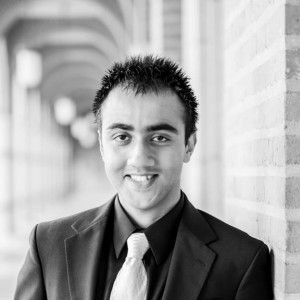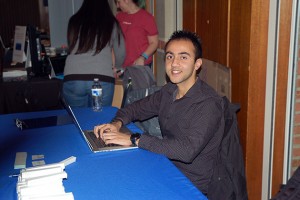 Five years ago, Rice University students who wanted to practice the coding they learned in their Computer Science (CS) courses had to find their own projects to work on — usually alone. That was what CS alumnus Waseem Ahmad set out to change.
Five years ago, Rice University students who wanted to practice the coding they learned in their Computer Science (CS) courses had to find their own projects to work on — usually alone. That was what CS alumnus Waseem Ahmad set out to change.
“When I was a CS sophomore at Rice in 2012, the only coding activity that I found outside of classes were the 1-hour Algorithm Challenges led by the CS Club,” he recalls from his office at Facebook in January 2016. “I thought it would be great to have a bigger event that allowed students to put what they learn in classes to practice and work on cool projects. I noticed that UPenn [University of Pennsylvania] hosted a hackathon every semester where participants got to do exactly that.”
Although UPenn had twice the number of undergraduates as Rice, Ahmad felt there was enough interest and talent here to host a local hackathon. “I wanted students at Rice to have the same opportunity [as our peer universities] so I founded HackRice in 2012. Our first hackathon had about 50 participants and 9 sponsors. Since then, HackRice has grown a lot and in 2014, we opened up HackRice to students outside of Rice.”
Ahmad, a member of the Rice Computer Science Club at the time, welcomed support from the club president, Dennis Qian. In subsequent years, the current club president continued offering support to each HackRice organizer. “Frank Salinas was CS Club president when Sal Testa organized HackRice 2013. I was CS Club president when Peter Washington organized HackRice 2014, and Carolyn Shuford was CS Club president when Aaron Roe organized HackRice 2015. Sal, Aaron, Frank, and I are returning as mentors and judges for HackRice 2016.”
Why Rice?
“I grew up in Pakistan and did my ‘O Level’ over there. O Level is equivalent to 11th grade so when I moved to Florida and attempted to enroll in 12th grade, they said O Level is sufficient for college and I didn’t need to go to high school. But I wasn’t prepared for college and didn’t even know which ones to apply for, so I started at a community college. After a year, I felt ready to transfer and I looked at UNC, Cornell and Rice. I got into two of the three and, online, Rice seemed like the best choice.” Then he laughs, “I’d never been to Texas, knew nothing about it.”
Computer Science was a given. “I declared like my first day at Rice,” he says with a grin. “Even though I was a transfer student, I ended up doing four years at Rice – there was so much I wanted to learn, so many courses I wanted to take.” Ahmad learned Java on a Pentium II computer when he was nine years old. “My older brother was in college and said I that I should learn Java, so I learned the basics of programming and created a little calculator on that computer in Java. That, along with my interest in computer games, got me interested in software engineering and I realized I could make my own programs and games, which is why I got into CS.”
Ahmad was assigned to Brown College at Rice. “Coming into Brown, most of the new friends I was meeting were also interested in CS. I was really vocal, especially freshman year, so people began to know me in class and at Brown. I remember Sal saying he was switching to CS and I said, ‘Awesome!’ and we started hanging out more. There were about six of us who were close friends at Brown and it was really unusual that in a relatively small department (CS only had about 14 students in the year above us) that so many of us in the same college would be in CS. I became more involved in the Rice CS Club, and a major part of my social life was centered around CS.”
Why Create a Hackathon?
Ahmad thinks back to a moment in 2012. “So I was in front of Duncan Hall, after one of the CS Club 1-hour Algorithm Challenges, and just asked, ‘What else can we do that is competitive and would allow us to apply what we learned in CS classes?’ Maybe a semester long competition? No, that was too long. I had heard UPenn held weekend-long contests to build software applications, so we decided to use that model and have our own hackathon at Rice.”
From idea to implementation was a long process. “It was very daunting,” he admits. “An event like this costs money and the CS Club didn’t have much money at all. We needed funding. We agreed that we would reach out to companies and see if they would sponsor us.” He didn’t get a lot of encouragement at first; one of the CS professors even said, “They’re not going to do that.” But Ahmad and other members of the CS Club reached out to a lot of companies, even though they had no record of having ever hosted a hackathon.
“We reached out, and in companies where we had alumni, we got a positive response. Our lead sponsor was Dropcam. Without their sponsorship, we would not have been as successful. Aamir Virani, the co-founder of Dropcam, gave a talk during the closing ceremony of the event, met many of the participants at HackRice, and interviewed a few of them. He ended up hiring one of my friends from Brown for a summer internship.”
Ahmad continues, “Dropcam paid for the cost of printing T-shirts in addition to providing the largest sponsorship package, but they weren’t the only sponsor. We needed every dollar that was contributed, to serve meals and give away T-shirts and give out cash prizes to the top two teams in each of three categories.”
Because the first HackRice drew only 40-50 participants, the organizers were actually able to participate in the coding competition. Ahmad says, “I had never been to a hackathon before this one. We had about 10-12 hours of dead time so Denis [Qian, then CS Club president] and I started working on an app together. We found an API for getting rhymes for words, learned Javascript, and created a poetry composer app. Type in a line and hit enter to get a panel showing rhymes for every word that you typed. Four years later, it still works!” http://paradehackrice.appspot.com/
Preparing for Technical Interviews
Ahmad’s technical knowledge and confidence gained through algorithm challenges and hackathon experience paid off. The summer after he organized HackRice, he interned at Google. But he still remembers the incident that triggered his passion to solve real problems. “As a freshman, I bombed my first tech interviews. Almost a year later, in addition to staying really focused in my classes, I had really prepared for my technical interviews through the algorithm challenges.” He also bought a book called “Cracking the Coding Interview” and said, “I finished half the book after bombing those first tech interviews.”

At HackRice 2016, CS alumnus Waseem Ahmad is triple-hatting as Facebook’s representative at their sponsor table, mentor to several hackathon teams and one of the judges.
Ahmad remembers getting a job offer at a hackathon. “Not at HackRice,” he says. “but while I was interning at Google, we heard about a hackathon that Facebook was hosting at the New York office, and it was open to all U.S. college students. My intern buddy from Google, two of his friends from UPenn, and I got on a bus, and got to New York an hour before the 24-hour hackathon began and left an hour after the hackathon ended. During this time, we met the Facebook engineers at the office and I was really impressed by their knowledge and the kind of technical challenges they dealt with. And the work culture at Facebook seemed amazing. Then they reached out to me after I got back to Rice, and I interned for them the following summer, which led to a permanent job offer in my senior year. Best. Decision. Ever.”
For more information on the largest academic department at Rice University, visit the Computer Science Department web site: http://cs.rice.edu.
Waseem Ahmad completed a B.A. in CS in 2014.
